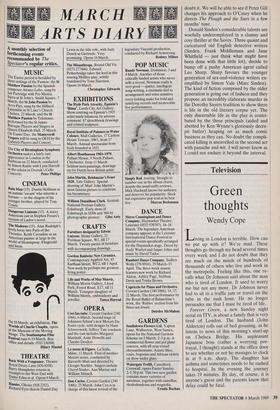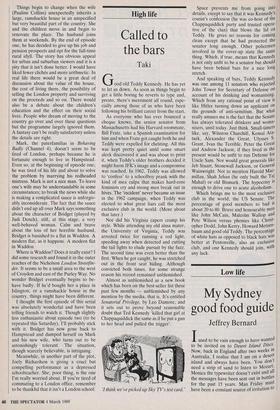Television
Green thoughts
Wendy Cope
iving in London is terrible. How can we put up with it? We're mad. These thoughts go through my head several times every week and I do not doubt that they are much on the minds of hundreds of thousands of others who live and work in the metropolis. Feeling like this, one re- calls what Dr Johnson said about the man who is tired of London. It used to worry me but not any more. Dr Johnson never had to sit in a traffic jam or travel on the tube in the rush hour. He no longer persuades me that I must be tired of life.
Forever Green, a new Sunday night serial on ITV, is about a family that is very tired of London. The husband (John Alderton) rolls out of bed groaning, as he listens to news of this morning's snarl-up on Chelsea Bridge. His unpleasant Japanese boss (rather a worrying por- trayal, I thought) stands at the office door to see whether or not he manages to clock in at 9 a.m. sharp. The daughter has asthma and sometimes needs to be rushed to hospital. In the evening the journey takes 19 minutes. By day, of course, it is anyone's guess and the parents know that delay could be fatal.
Things begin to change when the wife (Pauline Collins) unexpectedly inherits a large, ramshackle house in an unspecified but very beautiful part of the country. She and the children move in and begin to renovate the place. The husband joins them at weekends. By the end of episode one, he has decided to give up his job and pension prospects and opt for the full-time rural idyll. The story has obvious appeal for urban and suburban viewers and it is a pity that it isn't done better. I would have liked fewer cliches and more arithmetic. In real life there would be a great deal of discussion about the value of the house, the cost of living there, the possibility of selling the London property and surviving on the proceeds and so on. There would also be a debate about the children's education and the effect on their social lives. People who dream of moving to the country go over and over these questions but the programme largely ignored them. A fantasy can't be really satisfactory unless the details are right.
Mark, the paterfamilias in Behaving Badly (Channel 4), doesn't seem to be tired of London, perhaps because he is fortunate enough to live in Hampstead. Even so, at the beginning of episode one, he was tired of his life and about to solve the problem by marrying his redheaded mistress. Mark is not a nice man. To leave one's wife may be understandable in some circumstances; to break the news while she is making a complicated sauce is unforgiv- ably inconsiderate. The fact that the sauce didn't end up all over Mark says something about the character of Bridget (played by Judi Dench), still, at this stage, a very well-behaved woman. Calm and brave about the loss of her horrible husband, Bridget is banished to a flat in Waddon. A modern flat, as it happens. A modern flat in Waddon.
Where is Waddon? Does it really exist? I did some research and found it in the outer reaches of the Nicholson London Streetfin- der. It seems to be a small area to the west of Croydon and east of the Purley Way. No wonder Bridget eventually begins to be- have badly. If he'd bought her a place in Islington, or a ramshackle house in the country, things might have been different.
I thought the first episode of this serial was absolutely wonderful and have been telling friends to watch it. Though slightly less enthusiastic about episode two (to be repeated this Saturday), I'll probably stick with it. Bridget has now gone back to Hampstead and dumped herself on Mark and his new wife, who turns out to be astonishingly tolerant. The situation, though scarcely believable, is intriguing.
Meanwhile, in another part of the plot, Joely Richardson is giving a cruel but compelling performance as a depressed schoolteacher. She, poor thing, is the one I'm really worried about. If you're tired of commuting to a London office, remember to be thankful that it isn't a London school.

















































 Previous page
Previous page